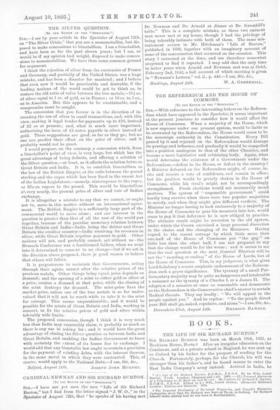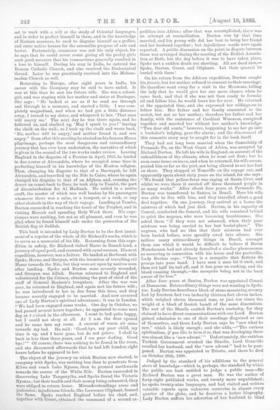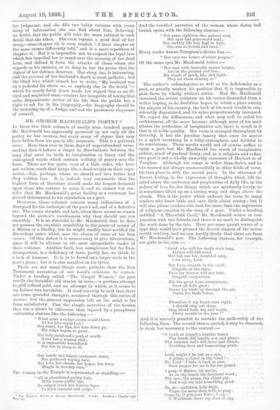BOOKS.
THE LIFE OF SIR RICHARD BURTON.* SIR RICHARD BURTON was born on March 19th, 1821, at Barkbam House, Herts.f After an irregular education on the Continent, and at a private school in England, he was sent up to Oxford by his father for the purpose of reading for thee. Church. Fortunately, perhaps, for the Church, his will was stronger than his father's, and he found means to enter the. East India Company's army instead. Arrived in India, he
* (1) Life of Sir Richard Burley, K.O.M.G., P.R.G.S. By his Wife, Isabel Barton. 2 vols. London: Chapman and t‘all. 1893.--(24 Personal Narrates of a Pilgrimage to Al Madinah and Mo. eah. By Captain air Richard F. Burton, K.O.M.G., F.R 14.8. Edited by lin Wife, Isabel Burton. (Memorial Edition.) London Tylstou aful Edwards. 1893.
f The Imperial Dictionary ef Universal Biography, and eaeselre Miniature Oyolopedia, Ave that Sir Richard was i born at Thant, in Galway. Sir Richard' himself states plainly that be was horn n Hertfordshire. set to work with a will at the study of Oriental languages, and in order to perfect himself in them, and in the knowledge of Eastern manners, he used to disguise himself as a pedlar, and enter native houses for the ostensible purpose of sale and barter. Fortunately, commerce was not his only object, for he says that he could never resist giving all the pretty girls such good measure that his transactions generally resulted in a loss to himself. During his stay in India, he entered the Roman Catholic Church, and also received the Brahminical thread. Later he was practically received into the Moham- medan Church as well.
Returning to Europe, after eight years in India, his career with the Company may be said to have ended. It was at this time he met his future wife. She was a school- girl, and was staying with her mother and sister at Boulogne. She says : He looked at me as if he read me through and through in a moment, and started a little. I was com- pletely magnetised, and when we had got a little distance away, I turned to my sister, and whispered to her, That man will marry mil The next day he was there again, and he followed us, and chalked up, 'May I speak to you leaving the chalk on the wall ; so I took up the chalk and wrote back, No, mother will be angry,' and mother found it, and was angry." Soon after this meeting he started on his famous Mecca pilgrimage, perhaps the most dangerous and extraordinary journey that has ever been undertaken, the narrative of which is given in the second of the two works under review. Leaving England in the disguise of a Persian in April, 1853, he landed in due course at Alexandria, where he occupied some time in perfecting himself in his knowledge of the Moslem religion. Then, changing his disguise to that of a Darwaysh, he left Alexandria, and travelled up the Nile to Cairo, where he again changed his disguise to that of an Afghan, and, crossing the desert on camel-back to Suez, he took ship to Yambit, the port of disembarkation for Al Madinah. He sailed in a native .craft, the master of which was well beaten by his passengers whenever there was a calm, or a tempest, or a rook, or any other obstacle in the way of their voyage. Landing at Yambit, Burton succeeded in reaching the tomb of the Prophet, and in visiting 3tIeccah and spending Holy Week there. His expe- riences were exciting, but not at all pleasant, and even he was glad when he found himself safe under the protection of the British flag at Jeddah.
This book is intended by Lady Burton to be the first instal- ment of a reprint of the whole of Sir Richard's works, which is 'to serve as a memorial of his life. Returning from this expe- dition in safety, Sir Richard visited Harar in Somali-land, a journey of equal peril, and crowned with equal success. His next expedition, however, was a failure. He landed at Berberah with .Speke, Herne, and Stroyan, with the intention of travelling vice Harar towards the Nile, but they were set upon by natives soon after landing. Speke and Burton were severely wounded, and Stroyan was killed. Burton returned to England and volunteered for the Crimea, obtaining the post of chief of the staff of General Beatson's irregulars. After the war was over, he returned to England, and again met his future wife; he was introduced to her in due form this time, and they became secretly engaged to be married. And now occurred one of Lady Burton's spiritual adventures ; it was in London. "We had been engaged some weeks. One day in October, we had passed several hours together; he appointed to come next day at 4 o'clock in the afternoon. I went to bed quite happy, but I could not sleep at all. At 2 a.m. the door opened and he came into my room. A current of warm air name towards my bed. He said : Good-bye, my poor child, my time is up, and I have gone, but do not grieve. I shall be back in less than three years, and I am your destiny. Good bye !" Of course, there was nothing to be found in the room, and she discovered afterwards that he had left London eight hours before he appeared to her.
The object of the journey on which Burton now started, in company with Spoke, was nothing less than to penetrate from Kilwa and reach Lake Nyassa, then to proceed northwards towards the source of the White Nile. Burton succeeded in discovering Lake Tanganyika, and Speke found the Victoria Nyanza; but their health and their money being exhausted, they were obliged to return home. Misunderstandings arose and jealousies ; injudicious friends, like Lawrence Oliphant, fanned the flame. Speke reached England before his chief, and, together with Grant, obtained the command of a second ex- pedition into Africa; after that was accomplished, there was an attempt at reconciliation. Burton was by that time married, and his young wife did her best to bring her friend and her husband together ; but injudicious words were again repeated. A public discussion on the point in dispute between them was arranged during the meeting of the British Associa- tion at Bath, but the day before it was to have taken place, Speke met a sudden death out shooting. All are dead now,- Speke, Burton, Grant, and Oliphant. Let their quarrel be buried with them !
On his return from the African expedition, Burton sought his fiancée, but her mother refused to consent to their marriage. He therefore wont away for a visit to the Mormons, telling the lady that he would give her one more chance when he came back, and that if she was not then ready to forsake all and follow him, he would leave her for ever. He returned at the appointed time, and she expressed her willingness to follow him. Her father and her family consented to the match, but not so her mother; therefore her father and her family, with the assistance of Cardinal Wiseman, conspired together and married her without her mother's knowledge. "Two dear old aunts," however, happening to see her go into a bachelor's lodging, gave the alarm ; and the dgnouement of this romantic story may be sought for in the book itself.
They had not long been married when the Consulship of Fernando Po, on the West Coast of Africa, was accepted by Richard Burton. He left his wife in England, on account of the unhealthiness of the climate, when he went out first ; but he soon came home on leave, and when he returned, his wife accom- panied him as far as the port, not being allowed to set her foot on shore. They stopped at Teneriffe on the voyage out, and apparently spent about sixty years on the island, for she says : "We found that yellow-fever was raging at Santa Crua, and whilst we were there it carried off three thousand people in as many weeks." After about four years at Fernando Po, Burton was transferred to Santos, in Brazil. Here his wife was able to live with him, and they travelled about a good deal together. On one journey, they arrived at a house the mistress of which had just died. Burton, in his capacity of Consul, conducted the funeral, and his wife remained behind to quiet the negroes, who were becoming troublesome. She asked them " if they were not ashamed, when their poor mistress was being carried to her last burial-place." The negroes, who had no idea that their mistress had ever been buried before, were speedily awed into silence. She notices many extraordinary things in Brazil, amongst them one which it would be difficult to believe if Baron Munchausen had not already described a similar phenomenon as occurring in connection with his horse and the portcullis. Lady Burton says : "There is a mosquito that fastens its prongs into your hand. I have seen a man let it sunk, and then cut half its tail off, and it has gone on sucking, and the blood running through, the mosquito being not in the least. aware of its loss."
After four years at Santos, Burton was appointed Consul at Damascus. Extraordinary things were not wanting in Syria, too. Lady Burton describes a block of stone measuring seventy feet by fourteen feet two inches by thirteen feet eleven inches, which weighed eleven thousand tons, or just ten times the weight of a block of Scotch basalt of the same dimensions. The sect of the Shazlis excited Burton's curiosity, for they claimed to have direct communications with our Lord. Burton gained admission to one of their meetings disguised as one of themselves, and there Lady Burton says he "saw what he saw," which is likely enough ; and she adds,—" The curious spiritualism, if you like to term it so, that was developing there was almost like a new advent.' " Unfortunately, the ruthless Turkish Government crushed the Shazlis, Lord Granville recalled her husband, and the new advent " had to be post- poned. Burton was appointed to Trieste, and there he died on October 20th, 1890.
Judged by the standard of his additions to the general store of knowledge—which is, perhaps, the standard by which the public are best entitled to judge a public man—Sir Richard Burton was a great man. He was the author of forty-eight published works, and twenty more unpublished ; he spoke twenty-nine languages, and had visited and written valuable reports upon unknown countries in almost every quarter of the globe, and he deserves a better biography. Lady Burton suffers her adoration of her husband to blind her judgment, and she fills two bulky volumes with every scrap of information she can find about him, believing, no doubt, that the public will take the same interest in each detail that she takes. She even repeats a good deal of her story,—thus chapter vii. is even headed, "A later chapter on the same events differently told," and is a mere repetition of chapter vi. But it is impossible not to respect the loyal love which has impelled her to stand over the memory of her dead hero, and defend it from the attacks of those whom she regards as his enemies, or to deny to her the praise that the vigour of her defence deserves, Her story, too, is interesting, and the account of her husband's death is most pathetic ; but the blind love which caused her to write, "My husband was on a pedestal far above me, or anybody else in the world "— which for nearly forty years made her regard him as an M- used and neglected man—renders her incapable of taking that calm, dispassionate review of his life that the public has a right to ask for in his biography,—for biography should be the summing-up of a Judge, and not the passionate eloquence of counsel.




































 Previous page
Previous page